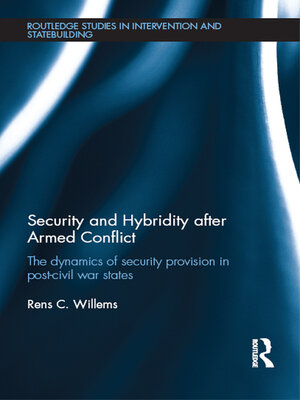Security and Hybridity after Armed Conflict
ebook ∣ The Dynamics of Security Provision in Post-Civil War States · Routledge Studies in Intervention and Statebuilding
By Rens C. Willems

Sign up to save your library
With an OverDrive account, you can save your favorite libraries for at-a-glance information about availability. Find out more about OverDrive accounts.
Find this title in Libby, the library reading app by OverDrive.



Search for a digital library with this title
Title found at these libraries:
| Library Name | Distance |
|---|---|
| Loading... |
This book examines the dynamics of security provision in international interventions in post-conflict states.
It focuses on how international security interventions – such as Disarmament, Demobilisation and Reintegration (DDR) programmes, Security Sector Reform (SSR) and Armed Violence Reduction (AVR) – play out in the post-civil war context in which they are implemented. The underlying assumptions of such interventions are that the state is the best placed to organise violence, that the ideal state has to function as an organisation with the legitimate monopoly on the use of violence, and that the primary task of the state is the provision of security. Post-civil war contexts, however, are characterised by hybridity, in which various authority structures are overlapping, cooperating and competing. The interactions between different security actors (both state and non-state) create struggles in society about whose security interests are promoted, which actions to provide security are considered legitimate, and about who is considered a legitimate security actor. This book investigates the interactions between international actors organising and supporting security interventions and the local security dynamics created by the interactions between both state and non-state actors involved in security. It draws on extensive field research in Eastern Democratic Republic of Congo, Burundi and South Sudan.
This book will be of much interest to students of statebuilding, peacebuilding, peace and conflict studies, security studies and IR.







